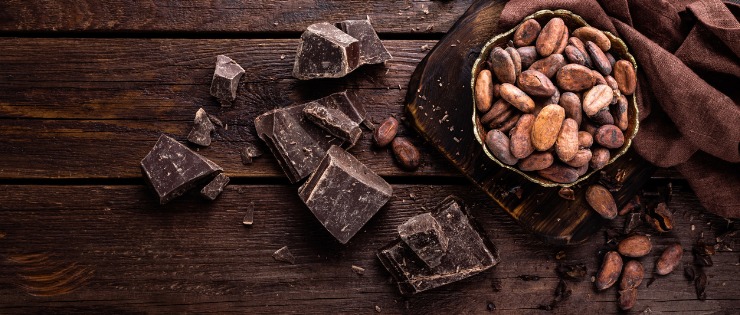
All the good things you’ve heard about dark chocolate are right. It has the power to protect our heart, and provide valuable minerals we need for overall good health. The level of antioxidants in dark chocolate are higher than some of the so-called superfoods.
But does chocolate have a dark side? It’s not all good news; even dark chocolate shouldn't be consumed in high quantities despite its health benefits. The saying ‘everything in moderation’ rings true when it comes to even dark chocolate.
What is Dark Chocolate?
Chocolate is made from beans of the cocoa tree. After harvesting from the tree, the beans are removed from their pod, fermented, dried, and roasted. The beans are ground to a cocoa mass or liquor which can be pressed to make cocoa butter and cocoa cake for grinding into powder. Cocoa liquor can be combined with cocoa butter, sugar and vanilla to make dark chocolate.
Also known as plain chocolate, the percentage of cocoa solids classifies dark chocolate. To be marketed as dark chocolate, it needs to contain a minimum 70% cocoa content.
Origins & History
The cocoa bean has a 4,000-year history. The ancient Inca and Mayan rulers drank small quantities up to 50 times per day to increase virility, despite its bitter taste. It was also thought to increase energy, happiness, stamina and focus. In the 1500s, cocoa beans were considered so valuable that they became the currency.
In 1828 a Dutch chemist invented a cocoa press which could squeeze out the cocoa butter from the roasted beans to then pulverise into a fine powder. The powder could be mixed with other ingredients and poured into moulds so that it can be eaten rather than drunk. In Britain in 1847, the first edible chocolate bar was made.
Rodolphe Lindt improved the texture and taste and began mass production in 1879. Cadbury, Mars and Hershey produced the first chocolates of the boom in the late 1800s and early 1900s.

The Claimed Benefits of Dark Chocolate
It’s no surprise that dark chocolate has health benefits. For hundreds of years, cocoa was consumed for its medicinal properties. Now we have research to back up the thoughts of our ancient forebears.
Heart Health
Flavanols and magnesium in dark chocolate keep the blood vessels open and regulate the heart rate improving the cardiovascular system. A study revealed that eating chocolate two or more times per week lowered the risk of calcified plaque in arteries by 32%.
Diabetes
Unlike other forms of chocolate, the dark variety lowers blood sugar levels. The cocoa makes the body more sensitive to insulin which reduces the risk of type 2 diabetes.
Brain Function
Dark chocolate increases blood flow to the brain and decreasing inflammation. The minerals in chocolate have also shown to reduce the chance of Alzheimer’s disease and dementia.
Reduces Blood Pressure
It’s not just the heart that benefits from dark chocolate’s flavanols and magnesium, blood pressure can also be reduced. Lower blood pressure decreases your risk of stroke, cardiovascular disease and dementia.
Asthma
People with asthma may not experience constricted bronchial passages and bronchospasms as often after consuming chocolate due to its caffeine, theobromine and theophylline.
Tooth Decay
Eating dark chocolate can even protect your teeth as the theobromine hardens tooth enamel.
Sun Protection
With long-term consumption, dark chocolate builds UV resistance and improved blood flow to the skin and hydration. Minimal erythemal dose (MED) is the minimum amount of UVB rays needed to cause skin redness 24 hours after exposure. A study showed that participant’s MED more than doubled after consuming dark chocolate for 12 weeks. The flavanols in dark chocolate also reduce stress hormones which break down the skin’s collagen.

Inflammation
An Italian study found people who ate small to moderate amounts of chocolate had lower levels of C-reactive protein which is a marker of inflammation.
Cholesterol Levels
Cocoa powder has been linked to decreased oxidised LDL (bad) cholesterol in men. It can also increase HDL (good) cholesterol.
Improve your Mood
Dark chocolate can increase your serotonin and endorphin levels thereby improving your mood and sense of well-being.
Aphrodisiac
Less stress and improved energy levels mean cocoa has been used as an aphrodisiac in modern and ancient times.
Flavonoids
Dark chocolate is one of the highest sources of flavonoids which benefit the cardiovascular system. In a small study of dark chocolate consumption, results showed reduced inflammation in women, improved lipid profiles and decreased platelet reactivity.
Are there any Health Concerns?
For all its health benefits. there are still some concerns about overeating dark chocolate.
Caffeine
Dark chocolate has a higher quantity of caffeine compared to other varieties of chocolate. Consuming too much caffeine can cause insomnia if eaten before bed, increased heart rate, anxiety, irritability and nervousness. Some people are more sensitive to caffeine than others so consider if you need to cut back on other caffeine products if you are going to enjoy a large bar of dark chocolate during the same day.
Kidney stones
For people who have had a kidney stone in the past or are predisposed to getting a stone, it may be wise to avoid dark chocolate. The oxalates in the chocolate increase urinary oxalate excretion which increase the risk of kidney stones. Kidney stones can be extremely painful and could require a trip to hospital.
Migraines
The natural chemical in chocolate, tyramine, may be a trigger for migraine headaches. The high sugar content can also raise blood sugar levels which is another trigger for migraines.
Should you Limit Your Consumption of Dark Chocolate?
While dark chocolate delivers a powerful punch regarding health benefits, more is not always better. There are the immediate symptoms of indigestion and nausea from overindulging plus the more long-term impact including:
Sugar
Dark chocolate might not have the same quantity of sugar as some of the other kinds of chocolate, but it still contains high levels that aren’t good for you. It is known as a calorie dense food because of the calories from the sugar and fat. High calories increase your chance of obesity and cardiovascular disease.
Lead and Cadmium Contamination
Trace amounts of lead have been found in numerous samples of dark chocolate. Cadmium, a probable human carcinogen, has also been found in chocolate. No one is entirely sure how these elements make their way into chocolate. There is one thought that it’s a naturally occurring process where the cocoa plant absorbs the lead, but another study showed that lead contamination occurs during the shipping and manufacturing process of the cocoa bean. Lead and cadmium are also found in the fertilisers and pesticides used on the cocoa plants.
Cadmium is present in other foods such as cereals, vegetables and nuts. We consume higher quantities of these foods than we do dark chocolate, so the amount of cadmium in chocolate is negligible.
What's The Difference Between Dark and Milk Chocolate?
The most critical difference between dark and other varieties of chocolate is the cocoa content. To be classified as dark, chocolate must contain a minimum of 70% cocoa. The higher the cocoa count, the more health benefits are derived.
The other significant indicator of the difference between dark and different kinds of chocolate is the sugar content. Milk chocolate has sugar listed before cocoa ingredients. If you are unsure if it’s dark chocolate, check out the sugar content on the label to make sure cocoa is listed first. Milk chocolate has milk solids added to make it less bitter.

It's the Cocoa That Makes it Good For You
The answer is in the quantity of cocoa. If a 100-gram bar of dark chocolate contains 70-85% cocoa, then it contains fibre and minerals including:
- 67% of the recommended daily allowance (RDA) for iron
- 58% of RDA for magnesium
- 89% of RDA for copper
- 98% of RDA for manganese
- 11 grams of fibre
- Other minerals in dark chocolate include potassium, zinc, selenium and phosphorus.
While you wouldn’t want to consume 100g of dark chocolate daily due to the calories and sugar content, a smaller quantity still gives you a range of minerals for good health.
The fatty acids in dark chocolate are also ideal because it has low polyunsaturated fats and high monounsaturated and saturated fats.
Dark chocolate contains up to six times more of the antioxidant catechins than milk chocolate contains. There is even more of the antioxidants polyphenols and flavanols in cocoa and dark chocolate than in blueberries and Acai berries according to one study.
70 Dark Chocolate Vs 90 Dark Chocolate
Phytochemicals like flavonoids contribute to the colour of chocolate. The more flavonoids, the darker the chocolate will be. The darker the colour, the more health benefits it contains.
Therefore, a 90% cocoa chocolate will look darker than a 70% cocoa chocolate.
Do Calories Change in Different Cocoa Quantities?
Dark chocolate nutrition has come under the microscope in many research studies. Many consumers conscious of their weight want to know how many calories are contained in dark chocolate.
A 100g block of a popular brand of chocolate will have a similar number of calories 560-590 between the 70% cocoa content to a 90% cocoa content. Eating a smaller quantity than 100g will mean the difference in calories will be negligible.
Which Chocolate Should I Buy?
With so many dark chocolates now on the market, it’s difficult to know which brand to buy. Unfortunately, some of it isn’t dark chocolate, it’s milk chocolate. Check out a few of the chocolate’s ingredients and processing methods you need to decide if it’s healthy or not. Keep in mind the following tips next time you're visiting the supermarket.
Sugar
Look at the list of ingredients and if sugar appears before the cocoa ingredients, you know it’s more milk chocolate than dark.
Dutching
Some dark chocolate undergoes a chemical process known as ‘dutching’ to reduce the bitterness of dark chocolate. All traces of flavonoid compounds are lost during the ditching process. Dutching is referred to as ‘processed with alkali’ so look out for this on the packaging of dark chocolate and avoid buying it.
Organic
With the growing trend for organic foods, some brands promote their chocolate as certified organic. Organic chocolate can be all varieties – milk, dark and white chocolate.
Fair Trade
A large proportion of cocoa beans grow on the Ivory Coast of West African where harvesting the cocoa is done by child slavery. Always look for a fair trade stamp on the packaging or buy chocolate made from cocoa grown in South America or Central America where child labour isn’t used.
Soy Lecithin
Soy Lecithin is the most common genetically modified ingredient in chocolate. It’s a byproduct of processed soybeans and is used as an emulsifier to prevent water and fat from separating.
Fats
Cheap varieties of chocolate like compound chocolate, use vegetable oil rather than cocoa butter for its fat content.
Consume in Moderation
Dark chocolate is all about quality, not quantity. You should only need a square or two after dinner to satisfy your chocolate craving. Unlike milk chocolate, you shouldn’t feel like consuming half a family block.
Research has shown that pairing dark chocolate with apples could boost heart health. Apple skins contain the flavonoid quercetin which acts as an anti-inflammatory. Dark chocolate contains the antioxidant catechin which prevents the hardening of arteries. When eaten together they can break up blood clots. For a healthy treat, slice an apple thin and dip into melted dark chocolate.
Shopping Checklist
When on a chocolate shopping trip, look for the following on the packaging to ensure you are buying ethically manufactured dark chocolate with optimum health benefits:
• 80% cocoa or greater
• Fair Trade
• ‘Processed with alkali’ doesn’t appear
So if you are looking for a little indulgent treat and a health kick at the same time, dark chocolate is one of the best. Nutrient-dense it packs a powerful punch so do a little research and find a good quality dark chocolate.